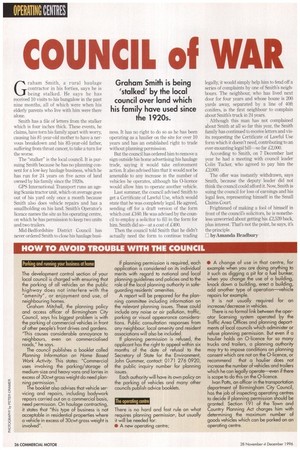COUNCIL of WAR
Page 28

If you've noticed an error in this article please click here to report it so we can fix it.
Graham Smith, a rural haulage contractor in his forties, says he is being stalked. He says he has received 10 visits to his bungalow in the past nine months, all of which were when his elderly parents who live with him were there alone.
Smith has a file of letters from the stalker which is four inches thick. These events, he claims, have torn his family apart with worry. causing his 81-year-old mother to have a nervous breakdown and his 83-year-old father, suffering from throat cancer, to take a turn for the worse.
The "stalker" is the local council. It is pursuing Smith because he has no planning consent for a low-key haulage business, which he has run for 24 years on five acres of land owned by his family since the 1920s.
GPS International Transport runs an ageing Scania tractor unit, which on average goes out of his yard only once a month because Smith also does vehicle repairs and has a smallholding on his land. Smith's Operator's licence names the site as his operating centre, on which he has permission to keep two units and two trailers.
Mid-Bedfordshire District Council has never ordered Smith to close his haulage busi ness. It has no right to do so as he has been operating as a haulier on the site for over 10 years and has an established right to trade without planning permission.
But the council has ordered him to remove a sign outside his home advertising his haulage trade, saying it would take enforcement action. It also advised him that it would not be amenable to any increase in the number of vehicles he operates, although his 0-licence would allow him to operate another vehicle.
Last summer, the council advised Smith to get a Certificate of Lawful Use, which would state that he was completely legal. He agreed, sending off for a draft version of the form which cost ,E160. He was advised by the council to employ a solicitor to fill in the form for him. Smith did so—at a cost of £400.
Then the council told Smith that he didn't actually need the form to continue trading legally, it would simply help him to fend off a series of complaints by one of Smith's neighbours. The neighbour, who has lived next door for four years and whose house is 200 yards away, separated by a line of 40ft conifers, is the first neighbour to complain about Smith's truck in 24 years.
Although this man has not complained about Smith at all so far this year, the Smith family has continued to receive letters and visits requesting the Certificate of Lawful Use form which it doesn't need, contributing to an ever-mounting legal bill—so far £2,000.
According to Smith, on 7 December last year he had a meeting with council leader Colin Tucker, who agreed to pay him the £2,000.
The offer was instantly withdrawn, says Smith, because the deputy leader did not think the council could afford it. Now, Smith is suing the council for loss of earnings and his legal fees, representing himself in the Small Claims Court.
Frightened of making a fool of himself in front of the council's solicitors, he is nonetheless unworried about getting his 12,539 back, plus interest. That's not the point, he says, it's the principle.
E byAmanda Bradbury




































































































